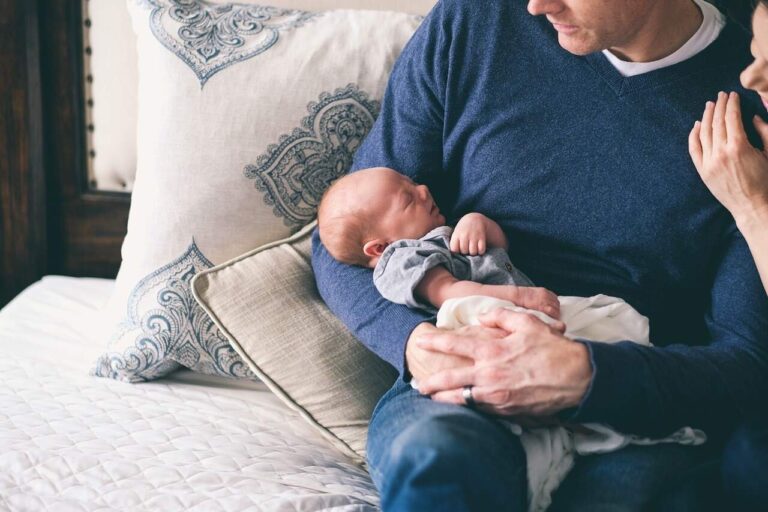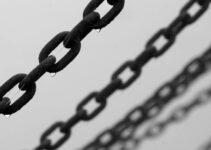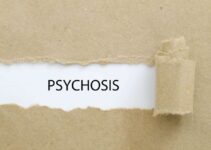Did you know, if your partner is depressed after the birth of your baby, then there’s a 50% chance you will be too? [4]
When you become a dad, you undergo an incredible amount of change. There’s a shift in your intimate relationship and your personal identity and you experience new emotions.
It can be demanding and overwhelming. And it can lead to paternal postpartum depression.
Below you will find a checklist which you can fill out and share with your healthcare provider. It will help you discuss your situation so you can determine if you need professional help.
Click on zoom icon below the checklist to enlarge the text, or click on the 
Paternal postpartum depression is a real condition, and it’s one that can be treated. If you’re feeling sad, unconnected to your baby and partner or want to feel more on track with fatherhood, then read on to find out more about paternal postpartum depression, available treatment options, and how to seek help:
Table of Contents
- What is paternal postpartum depression?
- How common is paternal postpartum depression?
- Symptoms: How do I know if I have paternal postpartum depression? [13]
- What makes me at risk of paternal postpartum depression? [6]
- What causes paternal postpartum depression?
- How can I assess if I have paternal postpartum depression? [6]
- How does paternal depression affect my relationship with my baby?
- How can I cope better as a father?
- When should I seek professional help?
- What treatment options are available?
- Outlook
What is paternal postpartum depression?
Paternal postpartum depression is a form of depression that usually occurs in the first twelve months after the birth of your child.
It can happen during pregnancy too. For some fathers the pregnancy period can be more stressful than the postnatal period. [1,4]
Paternal postpartum depression is characterized by all of the usual signs of depression but takes into account the unique psychological experience of becoming a dad.
How common is paternal postpartum depression?
Depression is most likely to develop in parents during the first twelve months of the postpartum period. [3]
Approximately 10% of fathers experience postpartum depression [3,4,6], and some research has indicated that rates can be anywhere between 4-25% of new fathers. [4] That statistic jumps up to 50% of fathers experiencing depression if their partner has maternal postpartum depression. [4]
Children with two depressed parents are at a higher risk of future social, psychological and learning problems. [1,2,3]
A study of parents expecting their first child found 13.3% of fathers experienced increased depressive symptoms during the third trimester of pregnancy. These fathers were more likely to be older, unemployed, under financial strain and men who have suffered more stressful life events than fathers who were not depressed. [5]
It is important to note; the evidence does not indicate men are more likely to experience depression in the perinatal period than at other times of their lives. [8] Most fathers do not experience higher levels of psychological distress during their partner’s pregnancy or the first twelve months of their child’s life.
[10] According to the World Health Organization (WHO), there are 450 million people affected by mental illness globally. In the United States, 51.8% of women and 48.2% of men experience depression in their lifetime. [3]
Symptoms: How do I know if I have paternal postpartum depression? [13]
Perhaps fatherhood hasn’t turned out how you’d envisioned and you find yourself feeling sad, irritable or helpless. [4]
You may feel detached from your family or excluded from the relationship your partner has with your baby.
Some dads say they feel like a bystander while the mother and baby bond. Pregnancy and early baby care can feel like ‘women’s business’ and you may be encouraged to take a step back, making you feel like you’re unimportant.
Not sure whether you’re feeling depressed?
These are some of the symptoms
- Low mood: crying, irritability, angry outbursts
- Poor sleep (unrelated to infant sleep patterns)
- Changes in appetite (overeating or undereating)
- Low motivation
- Thoughts of bringing harm to self, partner or baby [4]
Other warning signs
- Anxiety (feeling worried) [4]
- A sense of helplessness or guilt [4]
- Difficulties concentrating or making decisions at work [3]
- Destructive health behaviors such as increased consumption of alcohol or cigarettes [5]
Research shows that depressed fathers are more likely to:
- Spend less time reading and singing to baby [3]
- Engage in less physical play with child [2]
- Smack/spank their child than non-depressed fathers [3]
What makes me at risk of paternal postpartum depression? [6]
The three main predictors of paternal postpartum depression are:
- Previous experience of depression or anxiety at another time in your life [3]
- Your partner has maternal depression [3,5]
- You were depressed during the antenatal period [3]
- Paternal postpartum depression is also associated with: [3]
- Low levels of satisfaction in your relationship
- Unemployment
- Older age
- Financial stress
- Stressful life event in the past six months
- Feeling like fatherhood wasn’t what you expected
- Lack of social support
- Poor communication between parents
- Not feeling a bond with baby
- Feeling excluded from mother-infant bond
- Unplanned/ unwanted pregnancy [8]
- Labor complications [8]
- Being born in a foreign country [6]
- Having 3 or more children [6]
- Poor sleep quality in the antenatal period [5]
What are some of the factors that protect fathers during pregnancy from developing postpartum depression? [3]
- Good social support in pregnancy
- Antenatal education
- Sharing experiences with other expectant fathers
What causes paternal postpartum depression?
[3] Many parents believe postpartum depression in women is mostly biological.
While biology does play a role in why some women experience depression, it only reflects one area that impacts the significant emotional changes experienced by women in the perinatal period. There is a psychological and social component too.
These days many men are expected to be more hands-on in their infant’s life but also to maintain the traditional role as breadwinner. Long work hours can result in less time with the baby. This can place an immense pressure on dads who feel torn between spending time with their infant, supporting their partner, meeting employer demands and paying the bills. [4]
This is why postpartum depression is not unique to women who give birth; men also undergo their own psychosocial transformation.
Biological
Some people are more prone to depression due to genetic factors (family history of mental health issues), or due to a dependence on alcohol or drugs.
Organic conditions such as thyroid problems can also affect mood.
Social factors such as financial strain, a depressed partner, unhappy relationship and poor social networks can contribute to the stress that may lead to depression.
Psychological
The general way in which you cope with stress can influence the development of depression.
If you’re someone who keeps your feelings to yourself and turns away from people when you feel stressed (as opposed to turning to them for support), then you may be more likely to develop depression.
Other factors include negative thinking style, low self-esteem, and perfectionistic traits.
How can I assess if I have paternal postpartum depression? [6]
The Edinburgh Postnatal Depression Scale (EPDS) is a screening tool consisting of ten questions, primarily used to identify symptoms of anxiety and depression in women during the perinatal period. [11,12]
The screening tool has been considered useful in English-speaking fathers with a cut-off score of 10. [1,5]
If you’re concerned about how you’re currently feeling as a new father, I’d recommend completing the EPDS.
You can complete the EPDS and have it scored online here: https://psychology-tools.com/epds/
If you score 10 or more, it could be a sign you are currently experiencing anxiety or depression, and you should see a healthcare professional. If you score above 0 on question ten (thoughts of harming self or someone else), then you should see your General Practitioner (GP) immediately.
How does paternal depression affect my relationship with my baby?
Fathers have a unique contribution to the lives of their children. Even if you don’t feel important to your child, you certainly are and here’s why:
Babies as young as eight weeks old know the difference between their mothers and fathers and respond differently to each. Babies and children do appreciate differences in play, verbal communication and physical contact between their fathers and mothers. [9]
Research has shown that the more fathers participate in infant care (feeding, bathing and changing nappies), the more social their babies were, and at twelve months of age they were more resilient and coped better with stressful situations. [9]
Through fathering, babies learn about transitions, separations and love in a way that’s different than maternal love. In fact, fathers play such a crucial role in these areas that often toddlers show a preference for their fathers as they develop autonomy and separation from their mother. [9]
These are just some of the reasons why your child benefits from a relationship with you. This unique relationship fosters positive emotional development in a child. However, when a father is depressed, it has the opposite effect.
Children of depressed fathers are more likely to develop problems managing their emotions and hyperactivity. This is especially the case in boys. [1,2,3]
This information isn’t designed to make you feel guilty, it’s simply making the point that dads count too. You are a prominent figure in your child and partner’s life, and you mustn’t hold back on asking for help.
How can I cope better as a father?
There are many ways you can manage depression. Here are some suggestions:
- Increase your support: Talk to your partner, friends or co-workers
- Spend quality time with your baby: Get more hands-on and involved. It’s okay if your baby cries for their mother. If you stick it out, your baby will eventually learn to feel secure and trust you.
- Talk to other fathers: Join a father’s group or an online community where you can feel understood and supported during this big change in your life
- Seek professional help: Speak to your General Practitioner (GP) or a psychologist.
When should I seek professional help?
Often fathers don’t know where to look for resources on depression in the postpartum period. Much of the information is geared towards women and mothers. [3] Paternal depression just isn’t talked about, so it can be difficult for men to reach out to social support and healthcare professionals.
If you have undertaken the EPDS and scored 10 or above, if you just don’t feel ‘yourself,’ are concerned about your negative thought patterns, are feeling disconnected from your partner and baby, or are having suicidal thoughts, then it is highly recommended you seek professional help.
Sometimes it can be hard to seek help simply because you feel low in energy and motivation, or because you feel worried about being judged, but health professionals are trained to assess your situation and offer appropriate treatment options.
The first step in accessing professional help should be discussing how you feel with your GP.
What treatment options are available?
As with any form of depression, paternal postpartum depression is a treatable condition. If it is a severe form of depression, then medication may be recommended, however many women and men who have postpartum depression benefit from counseling and other types of help too.
Counseling
A qualified psychologist or mental health clinician provide you with a non-judgmental space to discuss how you are feeling, utilize specific interventions to address the symptoms and support you to engage in healthy behaviors.
Sometimes talking to someone outside of your family or social network can be just what you need to honestly get to the bottom of how you feel.
Medication
In some cases, anti-depressants or anti-anxiety medications are required to treat depression. You can discuss with your GP what options will be the most appropriate for you. Medication is most effective when you also engage in a psychological intervention, such as counseling.
Support groups/ parent education programs
Anxiety levels have been shown to decrease as a father’s confidence in infant care increases. Try to access more information about pregnancy, birth and caring for a child through the perinatal services your partner has access to. If you’re an expectant father, attend antenatal classes and meet with other dads-to-be.
Self-help
There is a range of books and online therapy programs that can support you to overcome depression.
Outlook
Postpartum depression in fathers is a common condition, and it is treatable.
Expectant and new fathers undergo psychological, emotional and identity change. Fatherhood can be motivating and rewarding, but it can also be demanding and overwhelming. During this time of immense transformation, some fathers develop anxiety and depression. If you are one of these dads, then remember, you are not alone. Paternal postpartum depression is common among new fathers, and there is support available.
As a father you play a significant role in your child’s life and if you are depressed then it can impact their development. It’s worth seeking help as soon as you can, for yourself and for your family.
References
1. Fletcher, R.J., Matthey, S., and Marley, C.G. (2006). Addressing depression and anxiety among new fathers. Medical Journal of Australia. 185(8), 461-463.
2. Fletcher, R., Feeman, E., Garfield, C., and Vimpani, G. (2011). The effects of early paternal depression on children’s development. The Medical Journal of Australia. 195(11/12), 685-689).
3. Edward, K.L., Castle, D., Mills., C., Davis., and Casey, J. (2015). An integrative review of paternal depression. American Journal of Men’s Health. 9(1) 26-34.
4. Kumar, S.V., Oliffe, J.L., and Kelly, M.T. (2018). Promoting postpartum mental health in fathers: Recommendations for nurse practitioners. American Journal of Men’s Health. 12(2), 221-228.
5. Da Costa, D., Zelkowitz, P., Dasgupta, K., Sewitch, M., Lowensteyn, I., Cruz, R., Hennegan, K., and Khalife, S. (2017). Dads get sad too: Depressive symptoms and associated factors in expectant first-time fathers. American Journal of Men’s Health. 11(5), 1376- 1384.
6. Carlberg, M., Edhborg, M., and Lindberg, L. (2018). Paternal perinatal depression assessed by the Edinburgh Postnatal Depression Scale and the Gotland Male Depression Scale: Prevalence and possible risk factors. American Journal of Men’s Health.
7. Isacco, A., Hofscher, M.A., and Molloy, S. (2016). An examination of fathers’ mental health help-seeking: A brief report. American Journal of Men’s Health. 10(6), N33-N38. Retrieved from: https://journals.sagepub.com/doi/full/10.1177/1557988315581395
8. Leach, L., Poyser, C., Olesen, S., Mackinnon, A., & Fairweather-Schmidt, K. (2014). The impact of pregnancy and early fatherhood on Australian men’s mental health. Centre for Research on Ageing, Health and Wellbeing: The Australian National University.
9. Pruett, K.D. (1997). How men and children affect each other’s development. Zero to Three.
10. World Health Organization. (2011). Depression.
11. Cox, J.L., Holden, J.M., and Sagovsky, R. (1987). Detection of postnatal depression: Development of the 10-item Edinburgh Postnatal Depression Scale. British Journal of Psychiatry. 150,782-786.
12. K. L. Wisner, B. L. Parry, and Piontek, C.M (2002). Post-partum Depression. The New England Journal of Medicine. 347(3), 194-199.
13. American Psychiatric Association. (2013). Diagnostic and statistical manual of mental disorders (5th ed.). Arlington, VA: American Psychiatric Publishing.







